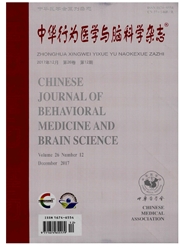

 中文摘要:
中文摘要:
目的探讨临床痊愈的抑郁症患者的生命质量,并分析其影响因素。方法筛选150例中国汉族抑郁症患者为研究对象,收集一般人口学资料,汉密尔顿抑郁量表(HAMD)、汉密尔顿焦虑量表(HAMA)评定临床症状严重程度,采用简明健康状况调查问卷(SF-36)和社会支持量表(SSS)评定生命质量及社会支持度。经治疗后定期随访,124例抑郁症患者HAMA、HAMD分值均小于7分,并达到临床痊愈,再次评定SF-36,采用艾森克人格问卷(EPQ)测量其神经质(N)、内外倾性(E)、精神质(P)3个维度。对照组为中国普通人群的生命质量常模。结果①临床痊愈的患者生命质量中除生理功能维度(PF)外[(89.23±14.09)分,(87.23±16.81)分,t=1.044,P〉0.05],其余7个维度生理职能(RP)、躯体疼痛(BP)、一般健康状况(GH)、精力(VT)、社会功能(SF)、情感职能(RE)、精神健康(MH)均比治疗前明显改善,差异具有显著性(P〈0.01)。与对照组生命质量比较,除PF外[(89.23±14.09)分,(89.01±15.73)分,t=1.266,P〉0.05],其他7个维度均低于对照组,差异具有显著性(P〈0.01或P〈0.05)。②生命质量影响因素采用多元逐步回归分析:神经质型、内外倾性人格、病期焦虑症状严重程度、经济状况、抑郁反复发作以及对支持的利用度对生命质量中的PF、RP、BP、GH、VT、SF、RE、MH7个维度均有影响(P〈0.05)。结论①抑郁症患者经治疗后,生命质量明显改善,但仍低于一般人群。②临床痊愈后抑郁症患者的人格特征、病期焦虑症状严重程度、经济状况、抑郁反复发作、社会支持均影响其生理心理及社会功能。
 英文摘要:
英文摘要:
Objective To investigate the health-related quality of life(HRQOL) of the recovered patients with depression and its influential factors. Methods From March 2008 to April 2009,150 depressive patients undergoing the following up treatment were recruited, and finally 124 patients recovered , and quality of life for patients recovered were compared to published norms for the general Chinese people. The general demography material scale, Hamilton Depression Scale ( HAMD ), Hamilton Anxiety Scale ( HAMA), personality traits ( Eysenck personality Inventory-EQP) ,the short form 36 item(SF-36) questionnaire and social support scale(SSS) were applied to all subjects. The SPSS 13.0 software for data processing,the group t test and the multiple linear regression analysis was adopted. Results ①The average score of seven domains of quality of life ( RP, BP, GH, VT, SF, RE, MH )for the recovered patients were better than that of the pre-treatment patients(P 〈 0.01 ) ,except the PF( 89.23 ± 14.09,87.23 ± 16.81, t = 1. 044, P 〉 0.05 ). But the average score of seven domains of quality of life for the recovered patients were worse than that of the healthy people(P〈 0. 01 ) ,except the PF(89.23 ±14.09,89.01 ±15. 73, t = 1. 266, P 〉 0.05). ②The quality of life of the recovered patients remarkably related with the anxiety level, neuroticism, extraversion, recurrent depression, economic condition and social support (P 〈 0. 01 ) Conclusion The recovered depressive patient 's health-related quality of life were improved significantly after treatment, what were influenced by neuroticism, extraversion, anxiety as a trait, recurrent depression, economic condition and social support. Above mentioned factors should be taken into account when rehabilitation.
 同期刊论文项目
同期刊论文项目
 同项目期刊论文
同项目期刊论文
 A polymorphism in the microRNA-30e precursors associated with major depressive disorder risk and P30
A polymorphism in the microRNA-30e precursors associated with major depressive disorder risk and P30 Decreased Regional Homogeneity in Insula and Cerebellum: an Resting-State fMRI Study in Patients wit
Decreased Regional Homogeneity in Insula and Cerebellum: an Resting-State fMRI Study in Patients wit Continuous GSK-3b overexpression in the hippocampal dentate gyrus induces prodepressant-like effects
Continuous GSK-3b overexpression in the hippocampal dentate gyrus induces prodepressant-like effects Possible Association of the GSK3b Genewith the Anxiety Symptoms of Major Depressive Disorder and P30
Possible Association of the GSK3b Genewith the Anxiety Symptoms of Major Depressive Disorder and P30 The Combined Effects of the BDNF and GSK3B Genes Modulate the relationship between Negative life eve
The Combined Effects of the BDNF and GSK3B Genes Modulate the relationship between Negative life eve 期刊信息
期刊信息
